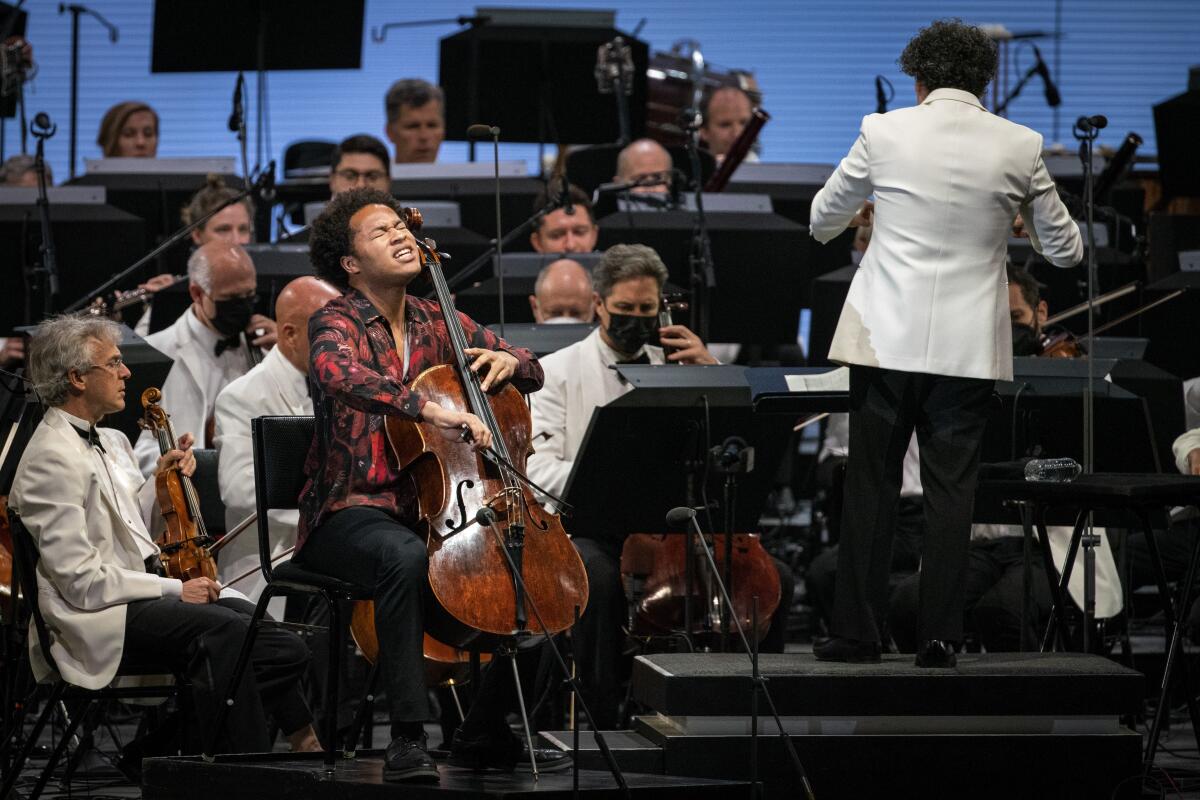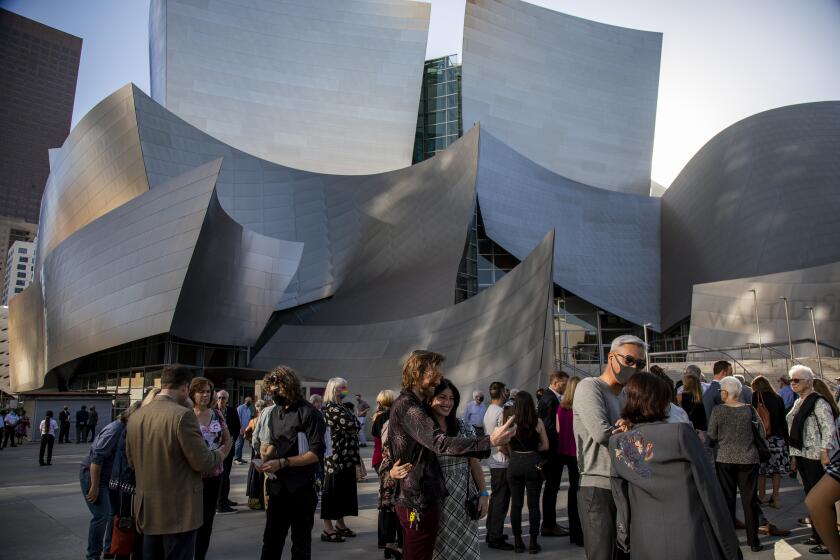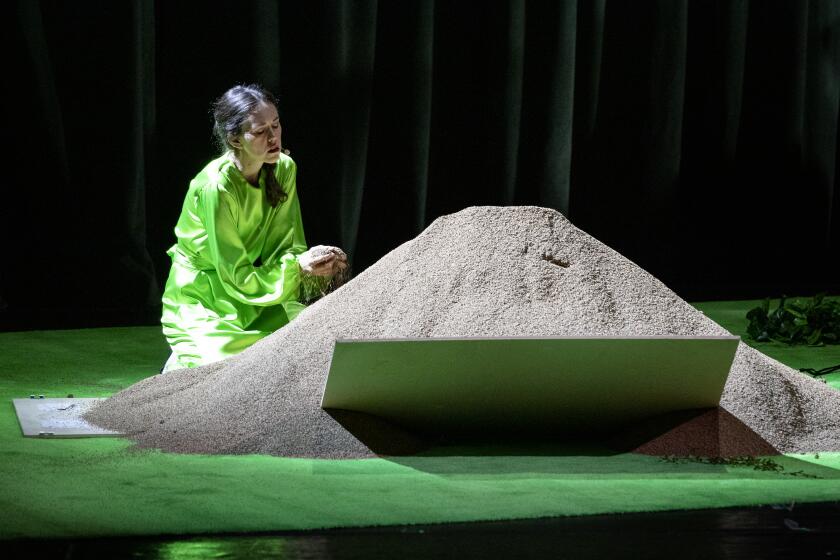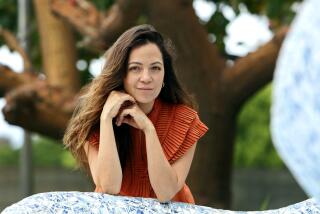Review: How to command the Hollywood Bowl? Sheku Kanneh-Mason and Gustavo Dudamel show the way

- Share via
Next month will mark 16 years since a 24-year-old Venezuelan conductor known only to industry insiders made his U.S. debut at the Hollywood Bowl looking like he already owned the place.
Back this summer for his longest Bowl residency with what has been since 2009 his Los Angeles Philharmonic (and will continue to be for another decade or more, if the orchestra has its way), Gustavo Dudamel has now fully paid off the mortgage.
The Hollywood Bowl is his. At age 40, he is its paterfamilias. Before Dudamel, you went to the Bowl for many reasons — the atmosphere, the social attraction, the hopes for one of those rare nights when music, typically little rehearsed, triumphs over distraction and acoustical adversity. Midway through Dudamel’s current three-week residency, you come for what is starting to feel like guaranteed greatness.
Last week, Dudamel brought to new life Dvorak’s “New World Symphony” in the most captivating concert performance I have heard of that overplayed warhorse anywhere. He came close to doing that again with Elgar’s “Engima” Variations on Tuesday.
Los Angeles Philharmonic is the latest to require proof of full vaccination, with no exception based on personal or religious beliefs.
Dudamel has done something else important during this residency: Guide young soloists in their Bowl debuts. On Tuesday, British cellist Sheku Kanneh-Mason’s confident, commanding performance of Elgar’s Cello Concerto had some of the same qualities of Dudamel’s Bowl debut.
The main difference is that Kanneh-Mason arrives already a star, so much so that at age 22, he seemed practically overdue for his first Bowl concert. He was well known as a teenage cellist on British TV when he turned heads at Prince Harry and Meghan Markle’s wedding in 2018, but that event catapulted him to instant international Instagram celebrity.
The classical world was ready for Sheku, as everyone called him. A few months earlier, he had released his heavily hyped bestselling first recording, “Inspiration,” which mixed a dynamic performance of Shostakovich’s First Cello Concerto, conducted by none other than Mirga Grazinyte-Tyla, with a hodgepodge collection of bits by Bob Marley, Saint-Saëns, Leonard Cohen and unexpected others. His Los Angeles debut, a recital with his sister, British pianist Isata Kanneh-Mason (who was also scheduled to appear with the L.A. Phil at the Bowl this summer but who ran into visa problems), confirmed the presence of a major artist in the making.
Coronavirus may have silenced our symphony halls, taking away the essential communal experience of the concert as we know it, but The Times invites you to join us on a different kind of shared journey: a new series on listening.
As Dudamel had been, Sheku Kanneh-Mason appeared right at home, right away at the Bowl. He made a statement.
Elgar’s elegiac concerto, so dated seeming in 1919 when it was new, its pastoral romantic musing out of sync with Britain’s post-World War I angst, was catnip to Jacqueline du Pré. She made a famed recording at age 20 that put her and the then-neglected concerto on the map.
While taken up by cellists of all sorts, Elgar’s wistfulness contains something that suits young soloists in search of soul-filling maturity, and that’s especially so for Kanneh-Mason. His playing is big and bold. He digs deeply for the cello’s deepest, most poignant character. Photogenic, he emotes for the screen, every bow stroke getting its own emotive facial expression. He skips along when Elgar slips along. He crushes the crush-worthy opening solo. The enraptured slow movement lushly and lusciously was a Bowl-ful.
For his part, Dudamel gave his soloist the room, the support and the dramatic heft to shore up the want for majestic seriousness. The amplification was loud, substantial and true. It rattled the bones. Kanneh-Mason’s new recording of the concerto with Simon Rattle doesn’t come off as well. In it, the majesty sounds jiggered for eternity. On Tuesday, there was more immediacy but not yet spontaneity. Kanneh-Mason knows what works and how to get it, and his commitment doesn’t let go of you for a second.
Dudamel was just like that when we first encountered him. Now, though more in control than ever, he has grown through years of risk taking that actually does allow him to appear to make music on the spot. You could almost feel Dudamel mentoring Kanneh-Mason, letting him have the chance to find that way. After Tuesday’s performance. the recording is already a document of juvenilia. The goal is for us to be saying the same thing about Tuesday a few years from now.
What Dudamel has most achieved since his Bowl debut is the increasing ability to find character in everything he conducts while holding onto the big picture. Music becomes its own world in his best performances, an environment onto itself.
Elgar’s “Enigma” Variations is all character, the aspects of the composer’s Edwardian pals and loves at the turn of the 20th century. And Dudamel exulted in each: a guy, Edwardian gruff like a bulldog; a woman, Edwardian lacy and lady-like. The performance changed on a dime as the members of Elgar’s gang each made an appearance. I normally don’t give a hoot about any of them. But here, the whole crew was a delight. “Nimrod,” the famed movement of emotional overkill that has become a funeral favorite, blossomed forth like an awesome creature growing in stop-motion cinema.
Next week, Dudamel concludes his current series of Bowl programs (he’ll be back next month for more) with Tchaikovsky’s Fifth Symphony on Tuesday and Thursday. That was on his debut program, brilliant but relying on what he knew, not what he might discover. There is only one way to find out what comes next. When you do, bring a good mask. You’ll need it.
If you don’t know Laurel Irene, learn the name. The soprano soars in Long Beach Opera’s ‘Voices From the Killing Jar.’
More to Read
The biggest entertainment stories
Get our big stories about Hollywood, film, television, music, arts, culture and more right in your inbox as soon as they publish.
You may occasionally receive promotional content from the Los Angeles Times.














